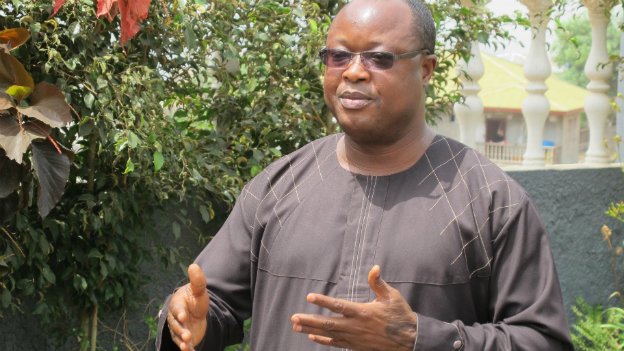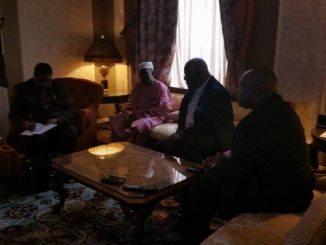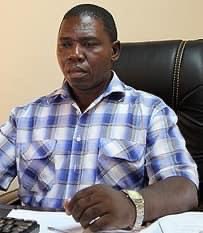
By Adikali Bai Daramy
As the case of sacked Vice President Alhaji Sam-Sumana (ASS) awaits final ruling in the Supreme Court, Lawyer Berthan Macaulay Jr. has on Monday 27th July 2015 in direct response to submission made last week by lawyers representing the former Vice President, submitted before the five Supreme Court Judges, “there is no specific definition for Supreme Executive Authority vested in the President of the Republic of Sierra Leone.’’
He said President Dr. Ernest Bai Koroma has the constitutional rights to remove his then Vice President, Alhaji Sam-Sumana.
He pointed out that section 41(b) of the constitution imposes constitutional obligation of the holder of the Office of Vice President and that obligation, he said, is not met in section 55 of the constitution.
ALHAJI SAM SUMANA
Lawyer Macaulay asserted section 40(1) is the Supreme Executive Authority that the President used to dismiss Alhaji Sam Sumana.
He said the President is the Head of State and that he is regarded as the Chief Executive, which he noted, goes with the power of that office.
He said having regard for section 40, 50 and 55 of the 1991 constitution, the President can relieve the Vice President from his office if he has not met the constitutional obligations under sections 41, 50, 51 of the 1991 constitution.
He took objection to the plaintiff counsel’s submission that membership to a political party stops immediately after election.
He said if such interpretation by the plaintiff is correct then Sierra Leone would have a non-citizen as President.
He said the qualification set out in section 41 is a continuous requirement in order to be a candidate.
“The candidate should have been nominated and put on a ballot box, and if there is more than one candidate the person with the highest vote is duly elected.”
On this backdrop, he stressed that the Plaintiff was not a candidate. He cited sections 44 and 45 of the Public Election Act of 2012.
He said Parliament would not have intended that the obligation and qualification set out in section 41 would only apply to election and not thereafter.
He based his argument on section 171 of the 1991 Constitution. He cited a number of case laws to support his assertion.
With regards to the issue of vacancies, he said, the section does not contained an expressed language that the Office of the Vice President will only become vacant in the instance set out in section 55 nor can such limitation be necessarily applied.
He submitted that for the court to arrive at the legal meaning of the interpretation of section 55, the court should apply the principles and processes outlined in the case of the 1st defendant, adding that the court should adopt it as a whole principle. He said the vacancy is not defined as stated in section 55.
He said counsel on the other side submitted that seizing to be a member of a political party by way of expulsion is not a violation of the constitution.
He said if someone disassociates himself from a political party and happens to be the President or Vice President or was kidnapped for instance for a period of six months or one year and it is reported that he or she is alive would it not be seen that vacancy has been created.
He said the press release which the Plaintiff relied on does not contain references made to section 50 and 51 of the constitution.
He urged the judges to provide meaning to the generic terms given in sections 41(b) and 55 of the constitution. He called on them to look into section 54(5) and 41.
He said the case of Abu Bakarr Atiku cited by the counsel was outdated and ought not to be regarded by the court.
He said the appointment of Vice President is subject to the approval of the President and not Parliament.
He said it is only the President of Sierra Leone that has the vested power to remove the Vice President from office and not certainly parliament and submitted that section 50 and 51 do not apply to the circumstance set out in section 51 of the 1991 Constitution of Sierra Leone.
He said lawyers representing the plaintiff submitted that the Vice President can only be removed in accordance with section 50 and 51 of the constitution but told the judges that the said sections cited by them relates to mental and physical incapacity and misconduct.
Lawyer Macaulay said one of the underpinning points in the Constitution of Sierra Leone is the separation of powers, the Legislative, Executive and Judiciary.
He said the office of the Vice President is part of the Executive arms of government and not the legislative arm.



